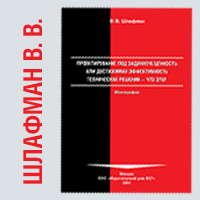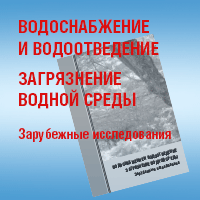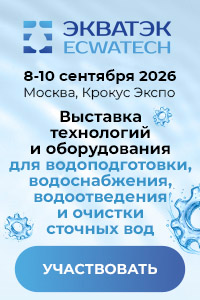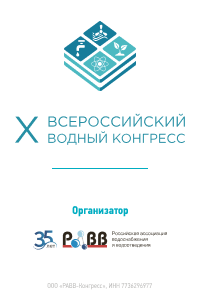№9|2020
ADVANCED TECHNOLOGIES AND EQUIPMENT
DOI 000000
UDC 628.166:661.418
Study of the corrosion and electrochemical properties of anodic coatings in conditions of chlorine electrolysis
Summary
Traditionally for water purification and disinfection various oxidizing agents have been used, usually chlorine-containing products including low-concentration sodium hypochlorite obtained by electrolysis of aqueous solution of table salt at the point of consumption. The greatest influence on the electrolysis efficiency (current active chlorine yield), electrical and electrochemical performances, effectiveness of the process and operational practices, design of devices and their durability is exerted by the anode material; the main requirement to it being the chemical resistance in the mode of anodic polarization in the chemically active environment. Ruthenium-titanium oxide anodes have become widely used in practice owing to their high-wearing properties. A decrease in the rate of continuous decrease in the thickness of the active layer and the loss of ruthenium oxide can be achieved by using a three-component coating of the anode with the addition of a platinum group metal – iridium. Three-component coatings of anodes containing iridium (iridium-ruthenium-titanium oxide anodes), with a mass percentage of iridium to ruthenium of 80:20 provide for 8-fold increasing the corrosion resistance of the anodes (service life). As the iridium oxide concentration increases, the anode coatings consume less energy for generating sodium hypochlorite owing to the lower voltage across the electrolyzer. The corrosion resistance of anodes with different ruthenium and iridium oxide fills as well as their characteristics, i. e. chlorine yield in terms of current efficiency, electrolyzer voltage, dynamics of active chlorine concentration increase were determined.
Key words
low-concentrated sodium hypochlorite , oxide coatings , iridium , ruthenium , corrosion resistance of anodes , current chlorine yield , electrolysis of 3% solution of table salt
The further text is accessible on a paid subscription.
For authorisation enter the login/password.
Or subscribe
REFERENCES
- Fesenko L. N., Denisov V. V., Skriabin A. Iu. Dezinfektant vody – gipokhlorit natriia: proizvodstvo, primenenie, ekonomika i ekologiia [Sodium hypochlorite as a disinfectant: production, application, economics and ecology. Under the editorship of V. V. Denisov. Rostov-on-Don, SKNTS VSH IUFU Publ., 2012, 246 p.].
- Medrish G. L., Teisheva A. A., Basin D. L. Obezzarazhivanie prirodnykh i stochnykh vod s ispol’zovaniem elektroliz. [Disinfection of natural and waste water with the use of electrolysis. Moscow, Stroiizdat Publ., 1982, 81 p.].
- Iakimenko L. M. Elektrokhimicheskie protsessy v khimicheskoi promyshlennosti: proizvodstvo vodoroda, kisloroda, khlora i shchelochei [Electrochemical processes in the chemical industry: production of hydrogen, oxygen, chlorine and alkalies. Moscow, Khimiia Publ., 1981, 280 p.].
- Gorbachev A. K., Brovin A. Iu., Tul’skii G. G., Vaulina E. N. [Impact of anode material on the processes of electrochemical synthesis of sodium hypochlorite solutions]. Voprosy Khimii i Khimicheskoi Tekhnologii, 2003, no. 1, pp. 112–116. (In Russian).
- Kovarskii N. Ia., Greben’ V. P., Drachev G. Iu. [Production of hypochlorite solutions from the sea water by electrolysis with the use of metal-oxide anodes]. Khimiia i Tekhnologiia Vody, v.11, no. 1, pp.63-66. (In Russian).
- Kul’skii L. A., Slipchenko A. V., Matskevich E. S. [Specific features of the operation of hypochlorite electrolyzers at low concentrations of chlorides in water]. Khimiia i Tekhnologiia Vody, 1988, v. 10, no. 5, pp. 438–441. (In Russian).
- Nebuchillov V. A. Korrozionno-elektrokhimicheskoe povedenie metalloksidnykh anodov na osnove dioksida iridiia v usloviiakh khlornogo elektroliza [Corrosion-electrochemical behavior of metal-oxide anodes based on iridium dioxide in conditions of chlorine electrolysis. Synopsis of a thesis for Ph. D. degree in Engineering. Moscow, 2003, 168 p.].
- Karlson R. K., Mouts M. S., Khardi K. L. [Pat. 2379380, RF. IPC С25В 11/10. High-efficient anode coating for producing hypochlorite]. Izobreteniia. Poleznye Modeli, 2010. (In Russian).
- Adler Iu. P., Markova Iu. V., Granovskii Iu. V. Planirovanie eksperimenta pri poiske optimal’nykh uslovii [Planning experiments while searching for the optimal conditions. Moscow, Nauka Publ., 1976, 279 p.].







